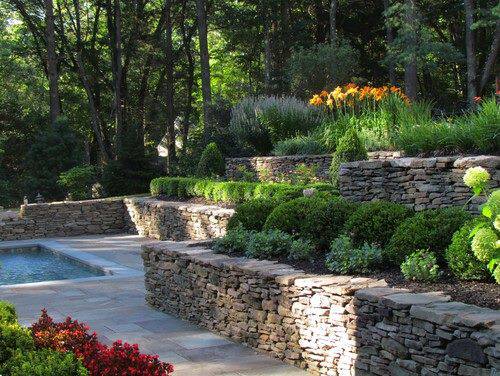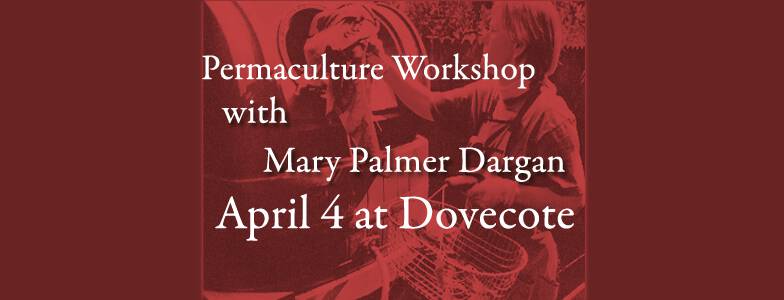Mary Palmer Dargan and Hugh Dargan were busy installing a pollinator garden at their offices in Cashiers, NC — when they were surprised by a guest and neighbor.
Inspired Spring Gardening with Raised Beds

The benefits of raised garden beds abound, and there’s no better way to ensure a bountiful garden than with sturdy and reliable raised beds. Gardening in boxes or contained areas makes it easier to maintain better soil and prevent weeds and pests. With more control over nutrient levels, soil temperature, and seed distribution, raised beds allow you to enjoy higher yields and longer growing seasons.
Raised beds not only make for beautiful and healthy gardens, but they can also add incredible aesthetic value to landscapes. As we enter the tail-end of the winter season, we’re dreaming of lush and gorgeous spring gardens with inspiring raised beds that are design elements in themselves.
- The classic raised bed is constructed with a wooden box. These are the traditional structures most people picture when hearing raised beds. Wooden raised beds can easily be designed with ledges on top to provide convenient seating for nurturing and enjoying gardens.
- Great for garden designs that are outside of the box, stone walls can be used to make creative and more organic-shaped raised beds. The cool tones and natural textures of stone masonry additionally create naturally stunning contrasts in the garden.
- Metal raised beds can be fabricated from troughs, stock tanks, culverts, slabs of steel or Cor-Ten. What’s so intriguing about metal raised beds is the industrial, modern, or rustic feel they can bring into garden designs. These types of beds not only create up-to-date designs but are long-lasting and weather-resistant.
- Other materials that can be used for raised gardens include rock, cinderblock, and brick. But no matter what materials are employed, there are still plenty of opportunities to create a custom garden design with the shapes, positioning, and configuration of raised beds.
- Beds can be configured into a grid pattern or organized to outline and surround a yard or patio. They can be terraced on a slope or laid into narrow rows like a small farm. Galvanized culvert beds or metal troughs can be arranged in a way that makes for a whimsical, shabby-chic garden or a chic, contemporary design.
Raised beds can be used to achieve any style garden, from formal designs to clean and contemporary landscapes to more casual, cottage-inspired looks. They can also be practical and functional. Picture being able to cook in an outdoor kitchen with herb gardens in nearby raised beds, or imagine being able to smell herbs as you dine and entertain al fresco.
Our team at Dargan Landscape Architects has the expertise and passion to design the garden of your dreams. Whether you’ve always wanted an edible garden or your entire landscape could use an update, our team would love to help. Contact us online or call 404.231.3889.
A Video: Installing Veggie Beds
At Dovecote, we are installing test beds for our pollinators and vegetables. Step 1 – testing the right size for our beds!
A Video: Starting a Veggie Garden Bed in North Carolina
Mary Palmer Dargan started installing a pollinator and vegetable garden at Dovecoat Porch & Gardens. Follow her along this summer as the work continues. Or, stop by Dovecote in Cashiers, NC for a visit. You’re welcome to stroll in the gardens and sit on our front porch.
Seed Blocking Workshop in Cashiers NC
Jump Start Your Summer Garden with Seed-Blocking!
Join me for a workshop on how to mix, press and plant seed blocks. Nurture your sets and plant on Mother’s Day. Learn how to successfully grow flowers in your garden. Help our butterflies and bees!
Details:
- Date: Saturday April 4, 2015 10-1 pm.
- Light lunch provided.
- Location: Dovecote Porch & Gardens 35 Flashpoint Drive Cashiers, NC. Instructor: Mary Palmer Dargan, rla. Small group.
- Fee: $25.
- For re-registration : [email protected] or call 828-743-0307.
About our workshop:
Action Steps for Planting on Mother’s Day
I find myself collecting seed packets like fine wine, putting them into the refrigerator for later use to preserve their freshness….Then, I get busy and forget to plant the summer flower seeds!
Do you have a stack of seeds ready to be planted? Do you love flowers, butterflies and bees? Hardy annuals like lychnis, queen anne’s lace and black eyed susans return each year after blooming. They rest in the mulch of your garden during the cold weather. Other annuals like zinnias and Bells of Ireland are more tender and not frost resistant. They need TLC to germinate and get their roots started in order to bloom early in our short, mountain growing season.
I plant tender annuals in early April and put them under lights in my warm attic; your warm basement or heated garage would do, too! Tender annuals need at least 16 hrs of light a day to stand straight and hearty. Their roots develop in the seed blocking media, so the baby plants are strong when planted and suffer no transplant shock. Planting medium, seed blockers, buckets, water and seeds will be available for the workshop. Plus, instructions on how to grow flowers successfully.
Why do we want to encourage planting hardy flower seeds? You remember these. They were in your grandmother’s garden. Each year they bolted effortlessly out of the ground and volunteered to populate summer borders…effortlessly. Or at least until your yard service came along, weeding and spraying them into oblivion. Or maybe the rabbits overtook.
I’m on a mission to reinvent your garden and mine. Have you ever tried a handprint garden? Its fun. Think like a 6 year old and put your hand on the soil, then put a hardy annual seed on each finger print. That keeps baby plants separated to grow well spaced. This genre of seeds likes to be cold for awhile. I recommend marking them with a well labeled plastic knife, or you will forget where they are. Our mission is to encourage native bees and butterflies to ravage these colorful blossoms this summer so both bees, butterflies and flowers can procreate. Now, I’m thinking of starting a seed library this fall.
So, if you are in the western North Carolina area, especially Cashiers and Highlands, please join us. If you prefer a video of our workshops to share with your friends, please watch and take part vicariously!
Just sign up for our newsletter and click the Garden Talk Salon option at www.dargan.com.
